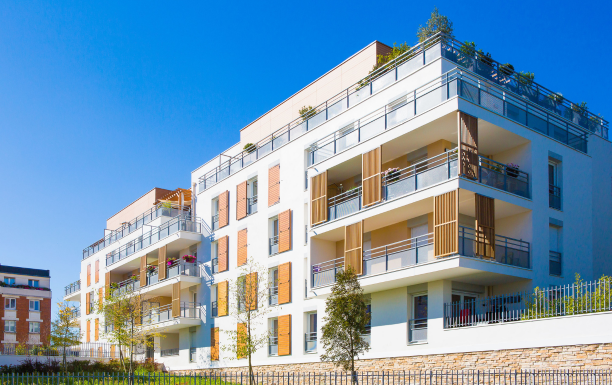
21 octobre 2025
A property is considered a condominium when there are at least two owners in the same building. Condominium in France is governed by the Law of July 10, 1965, which sets the rules for managing any building divided into multiple units.
This law distinguishes between :
- Private areas, which are for the exclusive use of each owner ;
- Common areas, intended for shared use by all residents.
Private areas include apartments, balconies, parking spaces, garages, and cellars. Each owner has exclusive rights to their private area. Common areas belong to all co-owners and include the land, green spaces, utility meters, rooftops, and elevators. Each co-owner owns a private unit and a share of the common areas, forming what is called a co-ownership unit.
Every co-owned building is governed by a Condominium Rules document. This document defines the rights and obligations of each owner, as well as the rules for shared living in the building.
It specifically covers :
- The division of private and common areas ;
- Rules for using shared spaces and facilities ;
- How expenses are shared among co-owners ;
- Governance procedures, including holding general meetings and voting on decisions.
The condominium Rules applies to all occupants, whether owners or tenants, and to any new purchaser of a unit.
In every condominium, three main parties work together :
- The co-owners’ association (Syndicat de copropriétaires), which includes all owners of the building ;
- The supervisory board (Conseil Syndical), composed of owners elected at the general assembly to monitor the building’s management ;
- The property manager (Syndic de Copropriété), appointed by the association to handle the daily administrative, financial, technical, and legal management of the building, as well as its maintenance.
Each year, all co-owners gather for the general assembly, which is the central event in the life of the condominium. Important decisions regarding the building are made at this meeting.
During the assembly, the main points include :
- Discussion and voting on key decisions ;
- Election of the supervisory board and property manager ;
- Review and approval of accounts and budget (previous year’s accounts and next year’s budget) ;
- Decisions on maintenance and renovation work.
Each co-owner has a number of votes proportional to their ownership shares. Decisions are recorded in meeting minutes, which serve as the legal reference for future management.
The property manager executes the decisions made during the general assembly. Their duties include :
- Signing contracts and overseeing work ;
- Arranging insurance ;
- Implementing judicial decisions if required ;
- Ensuring compliance with the condominium Rules ;
- Advising and informing co-owners and the supervisory board.
The manager is accountable to the co-owners’ association. They can be held responsible if they :
- Fail to execute decisions ;
- Act without required authorization ;
- Neglect to call the general assembly ;
- Commit a serious fault (e.g., misappropriation of funds or failure to maintain mandatory insurance).
The law requires a supervisory board. Members are elected during the general assembly and assist the property manager. Their support may be occasional (e.g., choosing staff or contractors) or ongoing (e.g., monitoring contracts, receiving work in the absence of a concierge, attending site visits).
The board elects a president who organizes meetings, leads discussions, liaises with the manager, and prepares an annual activity report for the general assembly.
The co-owners’ association exists as soon as a building has at least two units owned by different people. It has legal personality, which allows it to hold property, sign contracts, hire staff, and take legal action.
Its main responsibilities are :
- Preserving and maintaining the building ;
- Managing common areas ;
- Ensuring compliance with the condominium Rules.
In summary, the general assembly makes the decisions, the property manager implements them, and the supervisory board assists and monitors the manager. These three bodies work together to ensure smooth and transparent management of the property.
John & Cie is a locally-based, small-scale property management company serving Vitrolles, Marignane, Gignac, Saint-Victoret, Rognac, and nearby towns. Being a human-scale operation, we focus on proximity, transparency, and responsiveness, making it easy to communicate and ensuring efficient management of your condominium. Contact us for more information.
This site is protected by reCAPTCHA and the Google Privacy Policy and Terms of Service apply.